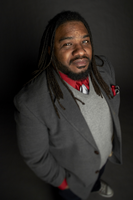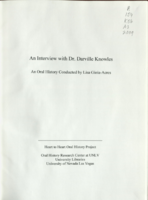Search the Special Collections and Archives Portal
Search Results

Moser, Wanda Ball, 1896-1979
Alternate Names
Wanda Ball Moser was a teacher and early resident of Southern Nevada during the early twentieth century. Her parents, Charles Packard Ball and Emily Rebecca Ward Ball, arrived in the Las Vegas, Nevada valley in 1906 and participated in the first land auction. Moser attended the University of Nevada, Reno and the State Normal School in Los Angeles, California. After graduating in 1917, she returned to Nevada and taught first grade at Las Vegas Grammar School. Later, she taught in a log cabin schoolhouse in Pioche, Nevada. Wanda Ball Moser married Alfred Arthur Moser November 13, 1918.
Person
Ida Brewington Pittman Papers
Identifier
Abstract
The Ida Brewington Pittman Papers date from 1906 to 1977 and contain personal and professional correspondence, ephemera, photographs, and newspaper clippings relating to the life of her husband, former Nevada Governor Vail Pittman. The newspaper clippings also include information about oil wells and the Bureau of Land Management (BLM) in Nevada.
Archival Collection
Audio clip from interview with Melody Stein, August 16, 2016
Date
Archival Collection
Description
In this clip, Melody Stein speaks about working in a new educational facility and the mural her students painted.
Sound

Meeting minutes for Consolidated Student Senate, University of Nevada, Las Vegas, October 24, 1978
Date
Archival Collection
Description
Text
Ralph Cadwallader oral history interview
Identifier
Abstract
Oral history interview with Ralph Cadwallader conducted by Jane Kurakazu on October 15, 2001 for the Public School Principalship Oral History Project. In the interview, Cadwallader discusses his family and upbringing in Massachusetts. He then discusses how he came to Las Vegas, Nevada in the late 1960s to teach at Garside Junior High School. He discusses his appointment as assistant principal at Western High School and Basic High School during the 1970s before being appointed as Associate Superintendent of the Clark County School District in 1978. He discusses his duties as Associate Superintendent and changes that he implemented at Valley High School, Clark High School, Bonanza High School, and Chaparral High School. He also discusses his philosophy as a school administrator, and how this philosophy influenced his interactions with educators and students. He briefly discusses his role as Associate Superintendent in Tempe, Arizona, but then discusses his 1999 return to Las Vegas as part of the Nevada Association of School Administrators.
Archival Collection

Maria Casas interview, June 12, 2019: transcript
Date
Archival Collection
Description
Interviewed by Maribel Estrada Calderón. Farmersville is described as a small town between, Exeter and Visalia, California populated by Mexican American farm workers. It is in this small town, where UNLV History Professor Maria Raquél Casas spent her childhood raised along with her sisters and brothers. In her interview, Dr. Casas describes how growing up in this small town with her traditional Mexican family influenced the person she is today. While working alongside her family in the fields, Dr. Casas decided that she would strive to obtain an education. Through hard work and constant support from her sister, Dr. Casas attended Fresno State, where she discovered her love for history. Upon completing her undergraduate program, Dr. Casas made the decision to further her education by pursuing a master's at Cornell University. At Cornell, she faced discouraging professors who believed she would not be able to complete the master's program let alone pursue a PhD program. Despite these demoralizing professors, Dr. Casas completed her program and was admitted into University of California Santa Barbara's history program. Dr. Casas never forgot her roots or the significance of her presence in the majority white academic spaces she attended during her academic journey. When she arrived at UNLV, she continued to strive for more Latino representation in both the student population and in the school faculty. During her tenure at UNLV, Dr. Casas has served as an advisor for multiple Latino student organizations including MEChA and SoL. Dr. Casas has witnessed much progress in Latino representation at UNLV, but she believes there is still much work left to be accomplished.
Text

Transcript of interview with Alma Athella Huffman by R.A. Grau, March 2, 1972
Date
Archival Collection
Description
On March 2, 1972, collector R. A. Grau interviewed former Justice of the Peace, Alma Athella Huffman (born May 2nd, 1909 in Bunkerville, Nevada) in her daughter’s home in Las Vegas, Nevada. This interview covers the history of Southern Nevada. Alma also offers an in-depth description of early life in Bunkerville, Nevada.
Text

Transcript of interview with Ivory Blue II by John Grygo, February 22, 2013
Date
Archival Collection
Description
Ivory H. Blue II was born and raised Las Vegas, specifically in the Westside neighborhood projects during the 1980s and 1990s. He describes his early childhood and what he remembers as a strong sense of community. Though grade school had its challenges, Ivory excelled in sciences and came under the watchful mentoring of Dr. Eugene McGaugh, a professor at UNLV. Ivory graduated with a master’s degree and has a long career already with NV Energy. Theresa Harris, Ivory’s mother, was from Hawthorne, Nevada and his father, Ivory Blue I, was originally from Edwards, Mississippi.
Text

Transcript of interview with Dr. Darville Knowles by Lisa Gioia-Acres, October 9, 2008 and November 9, 2008
Date
Archival Collection
Description
Dr. Darville Knowles was born in Miami, Florida, in 1948. His mother and father were schoolteachers in Dade County. After their divorce in 1962, Darville's mother relocated to Las Vegas with her two sons and took a teaching position here. Dr. Knowles comments on the differences between Miami and Las Vegas as far as segregation regarding housing, education, and job opportunities. He also mentions that his grandmother had emigrated from the Bahamas and that she impressed on them to make their own situation and community better. He recalls that track and field athletics were desegregated before the contact sports, such as football and basketball. Darville and his brother Michael (a lawyer in Miami) both graduated from college. Darville attended Howard University and Stanford University Medical School and completed his internship at the Jewish Hospital of St. Louis. Dan Wilkes, a family friend and pathologist in Las Vegas, convinced Darville to look at Las Vegas for job opportunities. After trying St. Louis, Atlanta, Houston, and Los Angeles, Dr. Knowles finally settled in Las Vegas in 1982 and "grew' his practice at Sunrise Hospital. Dr. Knowles comments on health problems in Las Vegas related to eating choices, lack of exercise, and poor air quality. He describes how HMOs have changed the practice of medicine and gives his opinions on how health care should be addressed by Congress. He also discusses the future of medicine, the research he was involved in, and the AIDS crisis. Dr. Knowles talks about how medicine has changed since 1982, the large number of respiratory problems that he treats, and comments further on HMOs and the fixture of medicine in Las Vegas. He also shares that he found time to author a murder mystery and has plans to write more.
Text
